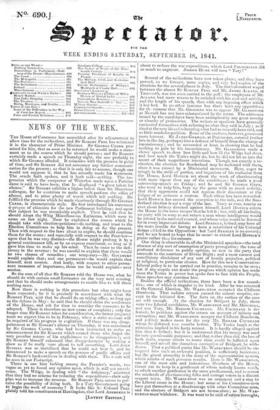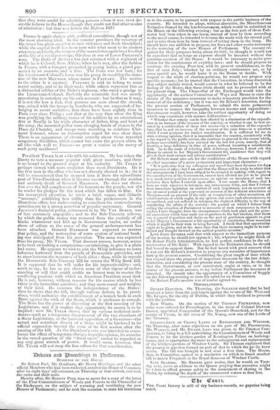Several of the reelections have now taken place; and they
have proved, as we foresaw, mere copies, and very bad copies, of the
elections for the several places in July. The farcical contest waged between the absent Sir ROBERT PEEL and Mr. JAMES ACLAND, at Tainnorth, was not even carried to the poll : the employers of Mr. ACLAND had more reason to be satisfied with his zeal and activity, and the length of his speech, than with any imposing effect which it has had. In no other instance has there been any opposition; for th: rumour that Mr. GISBORNE was to oppose Mr. GLADSTONE at Newark has not been substantiated by the event. The addresses issued by the candidates have been uninspired by any great novelty or vivacity of professions. The writers or speakers have generally contented themselves with referring to what they said in July ; as if tired at the very idea of reiterating what had so recently been said, and so little needed repetition. Some of the orations, however, possessed more interest. Sir JAMES GRAHAM, at Dorchester, entered (rather late in the day, perhaps) into a defence of himself from the charge of inconsistency ; and he succeeded at least in showing that he had nothing to gain by his inconsistency. Mr. GLADSTONE made a clever speech to show how little and how ill the Whigs had done, and how much the Tories might do, but he did not let us into the secret of their magnificent intentions. Though not exactly a re- election, the election for Sunderland may be reckoned with them, since it was caused by a Ministerial movement. Here, eager to mingle in the strife of parties, and impatient of his exclusion from the House, Lord HOWICK set about the work of electioneering with more vigour than any of the candidates : he made a good canvassing-speech on Friday ; and he and Sir GEORGE GREY, who went to help him, kept up the game with so much activity, that their opponents could not repress their discontent at the fatigue of so arduous a contest. Such virtue has been rewarded. Lord Howicx has caused the exception to the rule, and the Sun- derland election is not a copy of the last. Testy as ever, touchy as ever about bribery directed against himself, Lord Homes enters the House in the same temper that he left it : but, with all his faults, no party will be sorry to see return a man whose intelligence would be missed in the national council, and whose voice would be listened form every important debate. Lord STANLEY, indeed, may have all the more trouble for having so keen a scrutinizer of his Colonial doings added to the Opposition : but Lord STANLEY is no coward ; and we are bound to hope that he mew: to extort Lord Howices praise rather than his censure.
One thing is observable in all the Ministerial speeches—the total absence of any sort of assumption of party prerogative ; the tone of profound deference to public opinion, so new to the party that succeeds to the asserters of Divine Right ; and a most earnest and conciliatory disclaimer of any sort of hostile prejudice, political or religious, to particular classes. How far this new Conservative- Liberal policy is to be carried out in practice, remains to be seen ; but if any sceptic can doubt the progress which opinion has made since the Tories in power last spoke face to face with the People, these speeches may convince him.
Besides the official reelections, there have been a few casual- ties ; one of which is singular in its kind. After he was returned at the General Election, Mr. WARBURTON accepted the Chiltern Hundreds. That sudden retreat caused the utmost surprise, ex- cept to the initiated few. The facts on the surface of the case are odd enough. At the election for Bridport in July, there were two Liberal candidates, Mr. WARBURTON and Mr. MITCHELL, and One Tory, Mr. BAILLIE COCHRANE. Mr. COCHRANE is de- feated; he petitions against the return on account of bribery and corruption • and Mr. WARBURTON accepts the Chiltern Hundreds, and politely makes room for the very Mr. BAILLIE COCHRANE whom he defeated two months before. The Tories laugh at the admission implied in his hasty retreat. It is hardly alleged against him that he bribed ; but it is understood that his money was used for very questionable purposes; and that, rather than risk the loss of both seats, expose others to worse than could be inflicted upon himself, and unveil the shameless corruption of Bridport, he with- draws. That a political purist like Mr. WARBURTON should be en- trapped into such an awkward position, is sufficiently ludicrous ; but the grand absurdity is the state of the representative system, which admits of such perverse results. Here is Mr. Waimea-1.os, one of the most able and industrious Members of the House, thrust out to keep in a gentlemati of whom nobody knows much, to admit another gentleman in the same predicament, and to screen the misdeeds of electioneering folks and corrupt voters in a distant seaport town. Mr. WARBURTON was an ornament and a stay to the Liberal cause in the House ; but some of his Committee-men have put themselves at a disadvantage with other Committee-men, and the electors of Bridport are not immaculate; so Mr. WAR.. BERTON must■sithdraw. It was wont to be said of rotten boroughs, that they were useful for admitting persons whom it was most de- sirable to have in the House though they could not find other modes of admission : but that was before the Reform Bill I



























